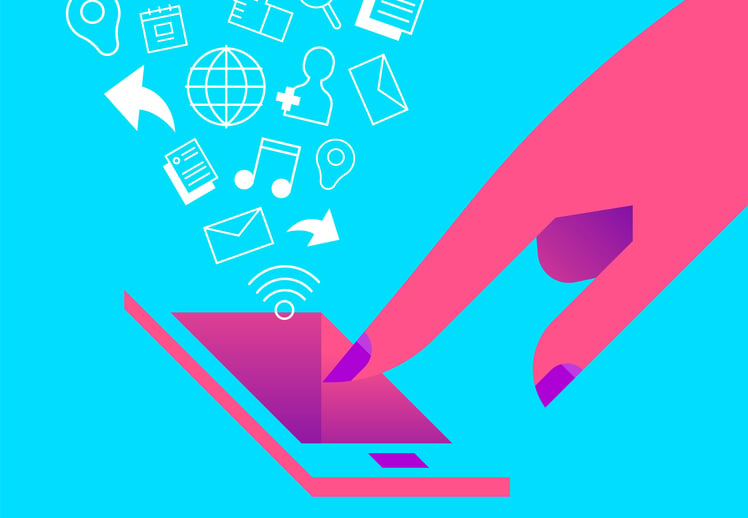This Is What Caused Millennials to Be so Different
It shaped Millennials and it's now shaping the behaviors of Generation Z and every other generation.

Millennial turnover, disloyalty, disengagement, and job-hopping can be explained in one word.
This word enabled me--a Millennial--to build my dream business while holding down a full-time job.
This word has entrepreneurs and business owners reimagining what's possible.
This word is putting never-before-seen stressors on organizations.
This word allows individuals everywhere to learn anything.
This word is empowering every consumer and employee.
This word provides game-changing perspective.
This word has changed the world.
The word is...access.
As far back as they can remember, Millennials have had access to the world's information curated into a blank search box in the palm of their hand. Generation Z (the post-Millennial generation) now has access to this information (thank you, Alexa) at the tip of their tongue. The next generation after them will be able to access information at the tip of their brain.
Millennials were the first generation to feel the impact of access. Access caused Millennials to have different perspectives, expectations, and behaviors. Access changed how Millennials job search, learn, socialize, travel, communicate, build businesses, network, entertain themselves, sell, buy, and work.
These new behaviors and expectations caused every industry and employer to scramble to try to make sense of this new generation, when, in reality, Millennials were becoming a product of their environment.
Because the environment was different, the generation became different.
The environment was the most high-tech, complex, and innovative in human history. This hyper-connected and fully accessible environment is now every generation's reality.
We now have abundant access to...
- Connectivity: Launch a business or brand with a webcam and Wi-fi.
- Information: Search YouTube to learn how to start a podcast, follow a news outlet on Twitter to receive instant breaking news notifications, or listen to an audiobook while on an airplane.
- Opportunities: Secure a job on Indeed or LinkedIn, sell on Etsy or Amazon, or freelance through Upwork or Lyft.
- Capital: Leverage crowdfunding platforms like Kickstarter and Indiegogo or membership platforms like Patreon to turn a passion project or idea into sustainable income.
- Travel: Seeing the world is easily within reach with Kayak, Google Maps, Google Translate, and Airbnb.
- Audiences: Create community, test ideas, get discovered, and/or sell goods and services via social networks and online communities.
- Entertainment: Play a puzzle, scroll through social feeds, or watch a movie, all from a phone.
- Cultures: Play Fortnite with someone halfway around the world in real-time or stream a Netflix documentary series.
- Tools: Square, Zoom, Slack, Asana, and so many more make it possible to be more efficient and productive personally or professionally.
- Products: Front-door delivery of the world's best-reviewed, healthiest, and most cost-effective products and services.
- Transportation: Exploring the world has never been more seamless with services like Uber, Bird, and Google Earth.
- People: Ninety-five percent of Americans own a cell phone and 75 percent can reach their phones without moving their feet 24 hours a day.
The world has been made accessible.
No longer are people constrained to the knowledge stored in their community buildings, a perspective of a neighbor, the bias of one news outlet, or by the position of their family tree.
The only thing constraining people now is a limited imagination, pride, or lack of ambition.
Ignorance and stagnation are now a choice for both individuals and organizations.
For organizations, access is challenging...
- the infrastructure of companies
- how and where employers recruit
- how companies train their employees
- how companies incentivize employees
- how companies retain top talent
- how companies get in front of customers
- the tools available for employees
Access is holding every company accountable to be better.
Access leads us away from average. If there are better employers, superior services, or improved products out there, they will be found.
Access has made it easy for disengaged employees to find a better company culture, move to a different location, and learn the new skill required to start a new job.
Access has made it easy for dissatisfied customers to search for an improved solution, watch testimonials, cost compare, and buy it at the lowest price.
Don't try to reform Millennials, Generation Z, or future workforces. Don't tell them to behave differently and expect them to comply. The world has changed, forever.
Instead, reform the environment. Build things (company cultures, leadership skills, products, etc.) that are worth flocking to.
As a Millennial and Generation Z keynote speaker and trainer, I help companies lead, engage, and sell to the emerging generations. If you'd like help solving tough generational challenges inside your organization, click here.

